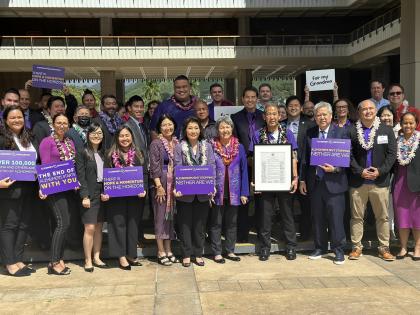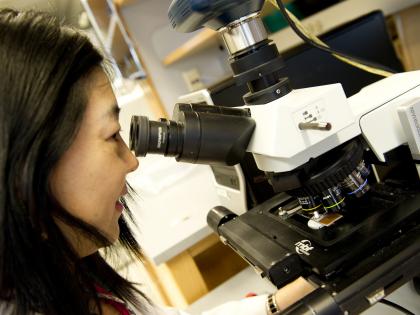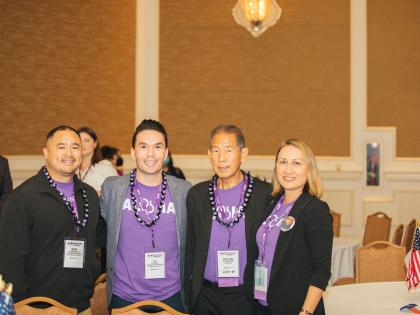Hawaii State Alzheimer’s Plan Overview

In 2011, the Hawaii Executive Office on Aging, in partnership with the Alzheimer’s Association Aloha Chapter, formed a special Task Force to develop a State Plan on Alzheimer’s Disease and Related Dementias (ADRD). The task force included representatives from state agencies, care provider organizations, community organizations, faith communities, and research centers as well as advocates, long-term care providers, consumers, and elder law attorneys. In December 2013, the Office on Aging published Hawaii 2025: State Plan for Alzheimer's Disease and Related Dementias.
In 2018, Governor Ige signed into law House Bill 1916, which mandated the Executive Office on Aging update and biannually report to the state legislature and the governor on the progress of the implementation of the Hawaii State Plan on Alzheimer’s Disease and Related Dementias. Following the receipt of a federal BOLD grant in October 2020, the Executive Office on Aging updated the Hawaii 2025 State Plan in alignment with the Healthy Brain Initiative (HBI) 2018-2023 Road Map. In September 2023, the Executive Office released the Hawai’i 2035: State Strategic Plan on Alzheimer’s Disease and Related Dementias. This newly revised plan proposes strategies to address data collection, program and policy change, public awareness and education, and workforce development.
Hawaii 2026 Policy Priorities

Establish the HANAI Memory Network
Over 31,000 Hawaiians are living with Alzheimer’s, but as many as half of them are not formally diagnosed. A timely diagnosis is the first step in ensuring that individuals living with dementia can benefit from care planning, clinical trials and new treatments, which can improve the quality of life and reduce the financial and emotional burden on caregivers. The Alzheimer’s Association is urging state lawmakers to appropriate $3 million annually to establish the HANAI Memory Network. HANAI (Hawai’i’s Assistance for the Navigation of Alzheimer’s Intervention) will create community-based memory clinics, deploy dementia care specialists, and integrate services within the Executive Office of Aging to ensure Hawaiians can receive an accurate and timely diagnosis.

Strengthen Hawaii's Alzheimer's Research Capacity
For decades, millions of Americans and their families have waited for advances in Alzheimer’s disease knowledge and improved, effective therapies for Alzheimer’s and other dementia. With $309 million in annual Medicaid costs to care for Hawaii’s Alzheimer’s population, support is needed to better understand this disease and enable new discoveries supporting treatment, prevention and a cure. Establishing an Alzheimer’s Disease Research Center (ADRC) at the University of Hawaii John A. Burns School of Medicine would advance understanding of the disease and provide research specific to the unique genetic, cultural and environmental factors of Hawaii’s residents, particularly its large Asian American and Pacific Islander (AAPI) population. The Alzheimer’s Association is calling on state lawmakers to support funding to launch the research center.

Empower First Responders with Dementia Training
First responders, such as law enforcement officers, emergency medical services (EMS) workers and firefighters, often interact with people living with dementia while intervening in crisis or disaster situations. Individuals living with Alzheimer’s and other dementia may present as uncooperative when they have difficulty communicating and understanding what is happening, and first responders may not know how to interact with individuals in these situations. Currently, first responders in Hawaii are permitted to receive dementia training but are not required. Without required training on how to recognize the signs of dementia and effectively communicate with people living with dementia, situations may escalate quickly with potentially dangerous consequences. The Alzheimer’s Association is urging state policymakers to support legislation ensuring one hour of dementia-specific training for first responders annually.
Hawaii State Advocacy Day
Join us for Hawai’i Alzheimer’s Advocacy Day 2026 — a powerful day of connection and impact! Advocates will share personal stories, meet with legislators and network with others passionate about improving the lives of those living with dementia. Expect inspiring conversations, policy updates and the chance to make your voice heard in shaping a future without Alzheimer’s and all other dementia for Hawai’i.
Sign Up to Learn About Advocacy Opportunities in Hawaii

Find My Chapter
Together, we’re making an impact. Find an Alzheimer’s Association chapter in your community for more ways to engage.
Contact Us
State Affairs Contact: Coby Chock
Phone: 808.451.3410
Email: ckchock@alz.org
31,200
people living with Alzheimer’s in Hawaii
62,000
Hawaii residents are providing unpaid care
$309 Million
Medicaid cost of caring for people living with Alzheimer’s (2025)
387.3%
increase in Alzheimer’s deaths 2000-2022
16%
in hospice with a primary diagnosis of dementia
83
number of geriatricians in Hawaii in 2021
Resources to Drive Change in Hawaii
The following resources developed by AIM and the Alzheimer’s Association will help you learn more about the issues impacting people living with Alzheimer’s and their caregivers, how Hawaii policymakers are addressing these gaps, and how you can help drive change.